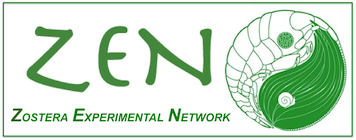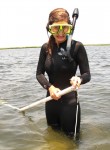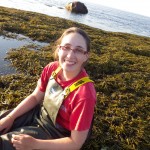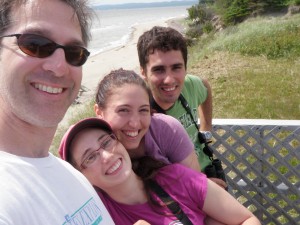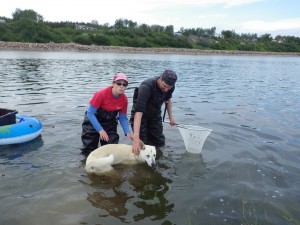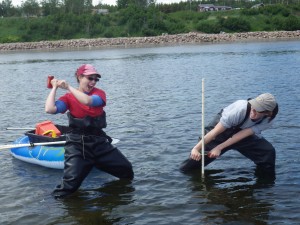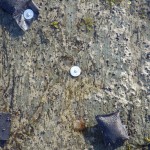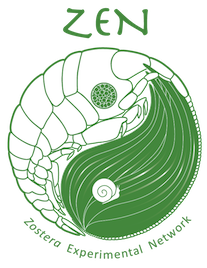Thankful for my day job
by Pamela Reynolds, ZEN Coordinator
This past week in the States we celebrated the Thanksgiving Holiday, which encouraged me reflect on all that I am thankful for – family, friends, and great colleagues near and far!
Continuing along the theme of creative collaborators, a film recently sent to me from grad student Ross Whippo in ZEN partner Dr. Mary O’Connor’s lab at the University of British Columbia in Vancouver, Canada, reminds me what a great career I have as a marine ecologist. What does your lab do?
Interest in the ‘ecological organism’ leads student to pursue “wet” science
by Stephanie Cimon (graduate student at the ZEN site in Quebec, Canada)
My name is Stephanie. I was born 25 years ago in Saint-Nicéphore (Québec, Canada). I am a Master’s student at the Université du Québec à Chicoutimi. Even two years ago, I had no idea I wanted to become a marine biologist. I always wanted to work with living things, from big animals to tiny cells. When it was time to choose a university program, I was captivated by how the human body works. So, I did my bachelor’s in biomedical sciences in Montreal. I was really interested in this subject, but while finishing my degree I realized that I wanted to spend time outside and so I started to take ecology courses. I think an ecosystem works a little bit like an organism. My curiosity in how the human body works was replaced by a interest in how entire ecosystems work. I then started another bachelor’s degree in biology at Chicoutimi and realized that I wanted to work with something related to water. I’ve always loved the water and especially the seaside.
In the winter of 2011, we had to choose a project for a course called “Introduction to Research”. I visited Dr. Mathieu Cusson who introduced me to the ZEN project. I knew I wanted to be part of it. Last summer I was hired to work in the intertidal zone of the St-Lawrence Estuary for the ZEN experiment and for three other projects. I spent all summer moving from one place to another and I really enjoyed it. Mathieu was really busy, and so I had to organize the planning of our ZEN experiment and prepare for the fieldwork and laboratory processing at our site. Thank to Drs. Cusson, Duffy and Reynolds, everything went well and I appreciated the experience I acquired doing it.
Our site is situated in Pointe-Lebel (N 49°06’, W 68°10’). The water there is quite cold at 13°C (55°F). There are some “holes” in the intertidal due to scouring action by ice. The holes can be more than 30 cm deeper than the surrounding area. We didn’t have wetsuits and instead used waders, so we had to watch our steps so we wouldn’t fall into one of those holes. The third day we were there to start the experiment, one of our team took the unwanted plunge. Fortunately that day, the tide was so low that the water was “hot” at 20°C (68°F). A few times, some of us made the mistake of bending a little bit too much while working in the water and flooded the waders with the icy seawater. I did it once, and by the end of that day the only part of my body that was not wet was my head. It’s a bit of a game to see who can stay the driest, or manages to get the wettest! Fieldwork is always good entertainment.
To carry the experimental materials out to our field site, we used beach boats, but every once and a while something would fall into the water. For example, somehow Mathieu’s backpack slid off the boat and onto the water where it rolled for few seconds before I grabbed it. When working in the field anything valuable needs to be kept in water tight bags to be safe.
This year, we are still participating in ZEN, but because we do not have enough time and labor, we were only able to participate in one of the projects involving assessing the intensity of predation of small crabs, shrimp and fish on small invertebrate grazers at our site. Our first visit to the site in June was a complete fiasco! We had such bad weather that we lost all of the experimental materials. First, a storm took our five minnow traps. We didn’t want to believe it, so we searched an hour. We kept up hope because the visibility in the water wasn’t good. After recovering two of the five bricks used to attach the traps, we had to face the truth. The ropes did not make it. We also lost 88 podsicles (a special little pole where a food item is glued) out of the 96 we deployed. We were luckier on our next visit last week. We had beautiful sun and hot weather. We recovered everything. We felt like it was a holiday!
I am now starting the fieldwork for my master’s degree studying the rocky shore of the St-Lawrence Estuary. My project is about the resilience (ability of a system to recover quickly) of the local benthic community. We removed everything living in 50×50 cm quadrats and burned the rock to be sure all we had left was bare rock. I want to examine the succession (development over time) of the algae and whether different perturbations such as grazing, nutrient enrichment, or thermal stress (through the removal of canopy forming fucales algae) can influence the ability of the community to recover. I think the algae will grow faster with nutrient enrichment, and that the grazer removals will cause slower recovery to pre-experimental conditions as grazing may be important for algal succession. I expect that thermal stress by canopy removal will make the return to normal difficult. I am excited to see if there are some differences. For now, there is still almost nothing on the rock, but I expect to soon see some mussels and algae begin colonizing the area.
Marine ecology is a stimulating profession I am pleased to discover day after day. I am glad to participate to the ZEN project for the second year and I am looking forward to see the results. It helped me choose my path as a biologist. Thank you ZEN!
